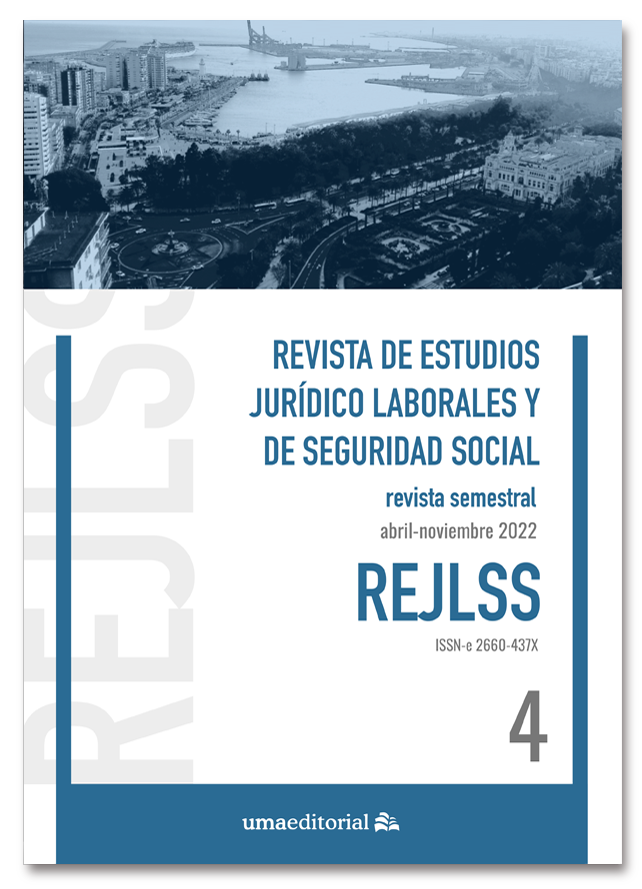Social Rights in Cinema
An Update in the Light of the Film ‘The good boss‘ and the Look of Fernando León de Aranoa
DOI:
https://doi.org/10.24310/rejlss.vi4.14413Keywords:
Fernando León de Aranoa, cinema, social rights, labor rights, precariousness, unemployment, immigration, prostitution, Javier BardemAbstract
The objective of this article is to develop an introductory analysis of the filmography of Fernando León de Aranoa from the point of view of social and labor rights after the movie premiere of ‘The Good Boss’, winner of six Goya awards, including best film. Initially, the short ‘Sirens’ is reviewed, in which he points some of his plot lines that will be developed from his first feature film ‘Family’, by producer Elías Querejeta, who will accompany him throughout his first stage until the emblematic ‘Mondays in the sun’. Next, this work analyzes his incisive look at today’s society through the losers, his turn towards international works based on book adaptations and the return to his own scripts with his latest film.
Downloads
Download data is not yet available.
Metrics
Metrics Loading ...
Downloads
Published
2022-03-18
How to Cite
Griñán Doblas, F. (2022). Social Rights in Cinema: An Update in the Light of the Film ‘The good boss‘ and the Look of Fernando León de Aranoa. Journal of Labor and Social Security Legal Studies (REJLSS), (4), 365–373. https://doi.org/10.24310/rejlss.vi4.14413
Issue
Section
Tribuna de Actualidad
License
In the Revista de Estudios Juridico Laborales y de Seguridad Social (REJLSS) we are clearly committed to a policy of open access to scientific knowledge (See Berlin Declaration).
Those authors who have publications with this journal accept the following terms:
This journal provides immediate free access to its content under the principle of making research freely available to the public. All the contents published in the REJLSS are subject to the Creative Commons license
Attribution-NonCommercial-NoDerivatives 4.0 International (CC BY-NC-ND 4.0)
Copyrights are of two kinds: moral and patrimonial. Moral rights are perpetual, inalienable, non-transferable, inalienable, unattachable and imprescriptible prerogatives. In accordance with Spanish copyright legislation, the authors who publish in REJLSS retain the moral right over their work, as well as the ownership of the patrimonial right, which will be transferred to the University of Malaga for its dissemination in open access.
The patrimonial rights, refer to the benefits that are obtained by the use or disclosure of the works. REJLSS is published in open access and is exclusively authorized to perform or authorize by any means the use, distribution, dissemination, reproduction, adaptation, translation or transformation of the work.
It is the responsibility of the authors to obtain the necessary permissions of the images that are subject to copyright.
Authors whose contributions are accepted for publication in this journal retain the non-exclusive right to use their contributions for academic, research and educational purposes, including self-archiving or depositing in open access repositories of any kind.
The electronic edition of this magazine is edited by the Editorial of the University of Malaga (UmaEditorial), being necessary to cite the origin in any partial or total reproduction.
The authors may adopt other non-exclusive license agreements for the distribution of the version of the published work (eg: deposit it in an institutional telematic archive or publish it in a monographic volume) provided that the initial publication is indicated in this magazine.
Authors are allowed and recommended to disseminate their work through the Internet (eg, in institutional telematic archives or on their website) before and during the submission process, which can produce interesting exchanges and increase citations of the published work.






19.png)
